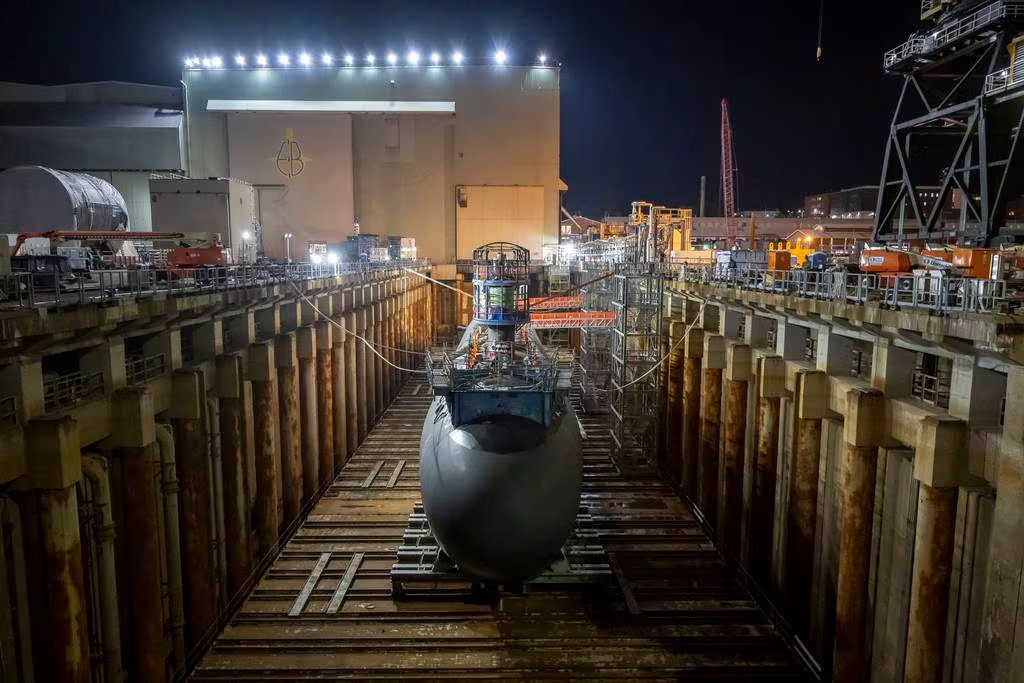
Key Points:
- The US Navy has requested funding for one Virginia-class submarine in fiscal 2025, while lawmakers are pushing for two.
- Lawmakers argue that reduced submarine orders will harm healthy vendors within the submarine-industrial base.
- The Navy maintains that investment in the industrial base is sufficient to support submarine production needs.
Submarine Showdown: Lawmakers Push for Increased Spending
A battle is brewing over the US Navy’s shipbuilding budget as a House panel pushes for procuring two attack submarines in fiscal 2025, contrasting with the Navy’s request for just one. The debate centers on maintaining the health of the submarine-industrial base and supporting both US and Australian naval needs under the AUKUS agreement.
The Navy’s Stance
Faced with a defense budget constrained by a 1% growth cap, the Navy has implemented a strategic reallocation of resources. This involves requesting funding for six new ships, including procuring a single Virginia-class attack submarine. To offset the reduced order quantity, Navy leadership asserts that submarine production capacity can be maintained in two ways:
- Advance Procurement Funding: The Navy intends to allocate substantial funds towards procuring long-lead-time materials and components before future submarine construction. This strategy aims to mitigate potential supply chain disruptions and shorten production timelines.
- Industrial Base Investment: The Navy plans to invest billions of dollars into programs directly supporting the submarine-industrial base. These investments will focus on enhancing vendor capabilities, such as modernizing production processes, expanding facilities, implementing advanced technologies and workforce development. The goal is to optimize vendor output and increase overall production efficiency within the submarine manufacturing ecosystem.
Lawmakers Push Back
Rep. Joe Courtney (D-Conn.), whose district houses major submarine shipbuilder General Dynamics Electric Boat, strongly opposed the Navy’s strategy. He refuted the assertion that investments in the submarine-industrial base (SIB) could fully compensate for the potential decline in direct submarine orders.
Submarine-Industrial Base Shows Signs of Recovery
Rep. Courtney advocates that the submarine-industrial base is demonstrating a solid recovery trajectory following disruptions caused by the COVID-19 pandemic. He highlights several key indicators to support this assessment:
- Workforce Growth: General Dynamics Electric Boat and Newport News Shipbuilding, the primary builders of Virginia-class submarines, have experienced substantial workforce expansion. This growth demonstrates increased capacity to handle production demands.
- Production Rate Increase: Submarine construction rates have increased, signifying improved output and efficiency within the shipbuilding process.
- Infrastructure Investment: New facilities are being constructed specifically to optimize the shipbuilding process, further contributing to industrial base capacity and efficiency.
Fiscal Hurdles Remain
Despite these positive indicators, proponents of the second submarine face a significant challenge in navigating the constrained defense budget. Funding would need to be reallocated from other defense programs to accommodate the additional submarine. Rep. Courtney has yet to propose specific areas within the budget where these reductions could occur.
At the hearing, the Navy also received criticism for delaying advanced procurement for its next two aircraft carriers and its lack of commitment to a multiyear purchase of San Antonio-class amphibious transport docks. Rep. Trent Kelly (R-Miss.), the subcommittee’s chairman, emphasized the importance of providing clear signals and predictable schedules to shipbuilders.
